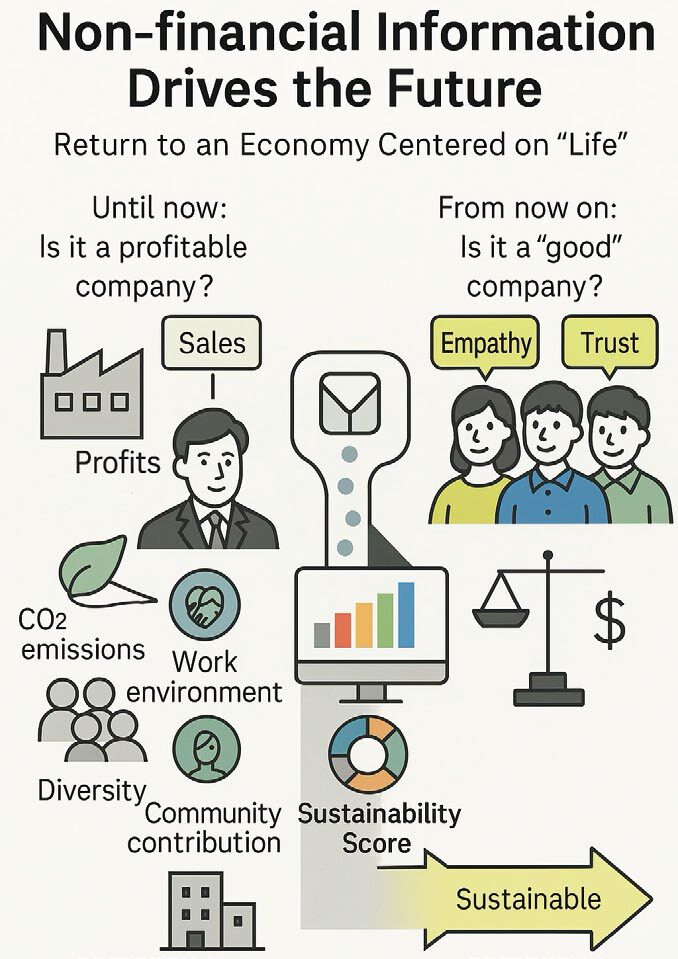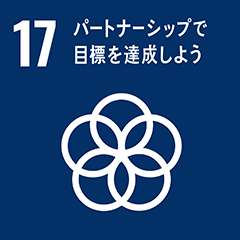Inochi Declaration
Visualize the various impacts of corporations on the environment, society, and humanity, and together support enterprises that embody kindness and enrich people’s lives and society, thereby realizing Keisei-Saimin—building a peaceful and prosperous world by saving and nurturing people.
Economic activity, at its core, should be an endeavor of Keisei-Saimin—enriching and sustaining life. The essential mission of a corporation is to pursue social values. Generating sustained economic profit is merely a means to this end. However, means and ends have become inverted, and the livelihoods of people and nature are often neglected.
To address this issue, Sustainable Lab Inc. has developed and provided tools that visualize the environmental, social, and human impacts generated by corporations. Over 4,000 companies and more than 30 financial institutions have already utilized these systems. The collected data is being compiled into a comprehensive database and shared with government agencies, contributing to the broader recognition of the importance of non-financial information.
Based on these achievements, the Inochi Forum and Sustainable Lab propose an action plan for a fundamental transformation of the economic system. The centerpiece of this plan is the development and use of “non-financial statements.” Just like financial statements, corporations would be required to create and disclose non-financial statements that quantitatively and qualitatively describe information on natural capital, human capital, intellectual capital, and governance structures. This will serve as a new indicator of corporate value—expressing the power of companies to enrich people and society.
Government agencies will also join this movement by establishing systems that make use of non-financial statements. For example, the Ministry of Internal Affairs and Communications could incorporate information from local governments and local enterprises into the basis for allocating local allocation taxes. Other ministries may refer to non-financial statements when determining the provision of subsidies or grants. The Financial Services Agency can encourage banks to take non-financial information into account when assessing loan applications or opening new accounts, thereby promoting the disclosure of comprehensive information. The Ministry of Health, Labour and Welfare may require companies to disclose non-financial information as part of their recruitment processes. Other ministries can also use such information when evaluating applications for business licenses.
Furthermore, prefectural governments and stock exchanges may adopt non-financial statements as part of their screening procedures and listing maintenance criteria. These changes, in many cases, do not require amendments to existing laws and can be implemented through administrative notifications issued by central government agencies.
As non-financial statements become widespread, the recognition that “companies creating high social value have greater future potential” will spread, and the evaluation of such enterprises will improve. Consequently, these companies will gain advantages in fundraising, recruitment, and transactions, creating a sustainable cycle where companies that fail to contribute to society are naturally phased out.
To ensure the stable operation of this system, three essential components are needed:
1.Tools for creating non-financial statements
2.Verification mechanisms and specialized institutions for auditing the statements
3.Models for aggregating and evaluating the information
These elements can be realized through the development of specialized human resources and operational tools.
Furthermore, concerns that pursuing social benefits may impair economic competitiveness can be mitigated. Standardized formats for non-financial statements and the spread of generative AI will streamline data aggregation and evaluation, minimizing any negative impact on economic efficiency. On the contrary, converting previously invisible “intangible assets” into economic value can enhance overall economic value and competitiveness. Public–private sector collaboration for the standardization of non-financial statements is already underway, and substantial progress is expected within a few years.

Making a company’s “invisible assets” visible
As the Inochi Forum seeks a transition to an economic system centered on Inochi, it will collaborate with diverse organizations like Sustainable Lab to create a system that visualizes the diverse impacts of corporations on the environment, society, and humanity—and support enterprises that embody kindness and enrich people’s lives and society.
[References]
・Evidence showing that system reforms by administrative and regulatory agencies can influence corporate behavior:
https://x.gd/w1KEb
・Evidence that consensus-building on standardized non-financial statement formats through public–private–financial collaboration is possible:
https://www.j-sdsc.org/
https://impact-consortium.fsa.go.jp/
[Action Platform]
Economy, Employment, and Poverty
[SDGs]




